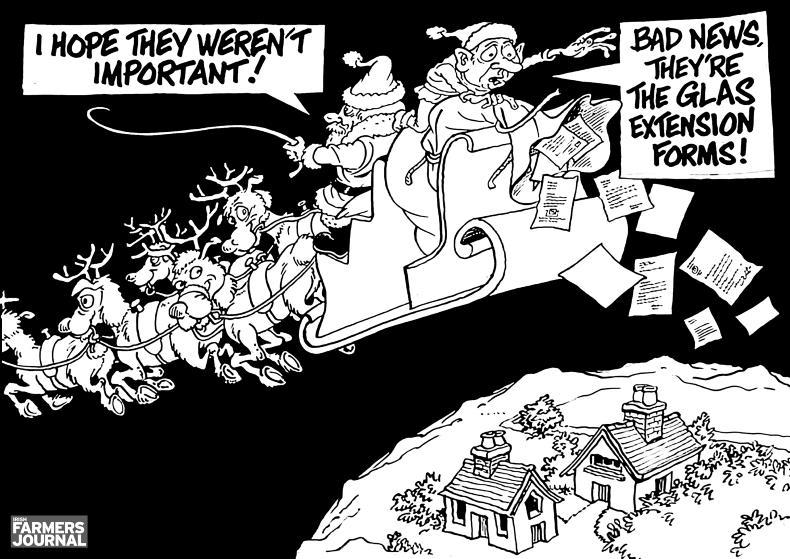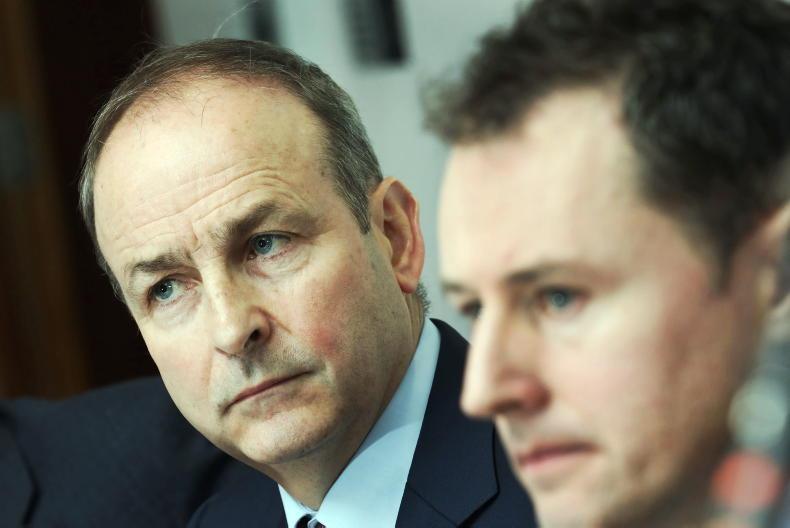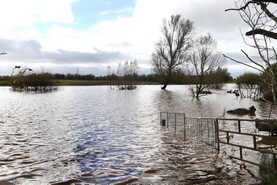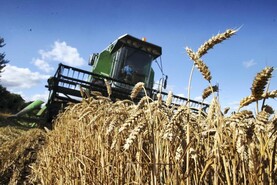At the end of last week, the European Commission published its recommendations for Ireland’s CAP strategic plan. The finalised plan will shape how CAP money is distributed to farmers. Barry Cassidy goes into detail in this week's edition. On reading the 30-page document, it appears it was crafted in consultation with the Department of Agriculture. It is surprising given the significance of the document that the Department did not seek to consult widely with industry stakeholders. We understand this to have been the case in other member states.
Few could argue with many of the observations in the report. It clearly points out that despite the significant increase in the level of value-add in the food chain, farmers’ share of this value has fallen from 20% to 16%. This inability to extract a fair price from the market is the main reason agricultural income is just 39% of the average income in the whole economy, with this percentage falling. In the absence of solutions being put forward to these income challenges, it is hardly surprising that, as the report identifies, the number of young people in the sector continues to decline.
There is extensive commentary and recommendations on improving biodiversity and water quality, and reducing gaseous emissions. Contained within the recommendations is the need for farmers to be supported in retaining and sequestering carbon in their soils. Providing incentives to reduce the level of methane produced from livestock is also recognised. If implemented, both would clear the way for the introduction of a carbon payment plus support for the adoption of new technologies in relation to breeding and feeding. Whether a carbon payment should be funded from CAP is a separate debate.
Overall, the environmental debate continues to be led by the Green Deal objectives to significantly reduce pesticide and chemical fertiliser use. The implications for farm productivity and food security are ignored. Unfortunately, the lessons of COVID-19 and the risks of outsourcing food production appear to have been forgotten.
Organic production is put forward as the utopian solution – with Ireland called out as a laggard with just 2.6% utilisable agricultural land under organics, compared to an EU average of 8%. This ignores the fact that albeit not classed as organic, many of our beef and sheep farms use exceptionally low levels of fertilisers and pesticides. It also ignores the economic realities: farmers do not spend money on fertiliser or pesticides because they want to – they do so because of market realties – mainly that consumers are not prepared to pay an adequate premium for organic produce to offset the drop in production.
Farmers do not spend money on fertiliser or pesticides because they want to – they do so because of market realties
Nevertheless, in the absence of any economic modelling and accepting that the market may not be in place, the Commission continues to pursue an organic agenda. We should remind ourselves of the last time farmers were encouraged to adopt a production model prior to a market being developed. In the case of miscanthus, most were left without an outlet for their crop and suffered heavy losses. It is this blinkered approach that sees the Commission almost totally ignore the application of science and economic modelling to any of the recommendations for Ireland’s CAP plan. As IFA policy director Tadhg Buckley comments, it is untenable for the Commission to put forward recommendations on the future of EU food production in the absence of any economic modelling – particularly when modelling by the US shows such a dramatic impact on farm incomes, food prices and global food security. The IFA is now calling for an economic impact assessment to be carried out at EU and national level.
The Commission should assess its own contribution in turning young people away from the sector. What future does a sector hold for a young person where the policy direction is developed without economic analysis and ignoring scientific developments? It is vital that in 2021 farmers have meaningful input into CAP. We have been aware of the need to develop a national strategic plan for nine months but farmer engagement has been limited – leaving the pitch clear for the Commission to take the lead.
A different approach will be required in 2021 – one where farmers start to play a key role in shaping CAP policy direction rather than reacting to it. It will require tough calls, particularly around the future direction of farm payments.
The need to target payments towards smaller farmers is something the Commission wants to see recognised in Ireland’s CAP plan. Developing a mechanism that delivers this while ensuring support is not diverted from genuine farmers to small farmers with big off-farm incomes will neither be straightforward nor without challenge. The push for Ireland to look at putting in place a strong complementary redistributive income support for sustainability (CRISS) fund to finance front-loading could prove even more divisive than convergence.
But, above all, the EU needs to decide if it is happy to outsource food production to the rest of the world and celebrate reduction of emissions in Europe while ignoring the consequences elsewhere.

\ Jim Cogan
Brexit negotiations: a hidden risk in plain sight
Another week, another Brexit deadline missed, but – importantly – talks continue, now dominated by French demands in relation to fishing – a politically sensitive subject for President Macron in national elections.
Unfortunately, Ireland’s exposure appears to have fallen down the agenda, with An Taoiseach Micheál Martin appearing more as a passive observer rather than being in the thick of discussions. Yet the exposure of the Irish economy to the outcome of Brexit dwarfs that of France. The value of the entire EU’s fishing rights to UK waters has been reported at €650m per annum – around €1bn less than the combined value of Irish beef and dairy exports to the UK.

French president Emmanuel Macron.
Given the scale of the exposure, farmers expect the Government to have secured key market safeguard measures in any deal. It will be critical that these include the necessary mechanisms to prevent a revolving door developing in Britain for agricultural commodities – one where British-produced food would secure unrestricted access into the EU only for their internal market to be topped up by cheap food imports from across the world. It would not be credible for Government to accept a Brexit deal that would see Irish food exports to Britain undermined by cheap imports only then to compete with British produce in the EU market.
To prevent this, any deal must contain a market value clause where future access for British food into the EU reflects the extent to which EU products are displaced by a UK cheap food policy. If a value transition period can be applied for fish, surely one can be developed for meat and dairy exports into the UK too.
A year like no other: reader support
I will never forget Wednesday 18 March. The Irish Farmers Journal had just gone to press with a skeleton crew in the office. We knew a full lockdown was coming and that the following week’s edition would have to be produced remotely. Could it be done? In truth, we didn’t know.
As I pulled the office door closed, the hairs were standing on the back on my neck. When would we be back? When would we be together again as a team? When would we be back out on farms, meeting you, our readers? Questions without answers.
Since that day, the team in the Irish Farmers Journal has been scattered across all 32 counties, working from bedrooms, lofts and – more recently, as the new norm set in – rapidly converted home offices. It has required a herculean effort by each and every one of them. For 40 weeks, our front page has been sent to our print press not from our offices in Dublin but from a home office in Belmullet, Co Mayo.

Restrictions in marts have varied since the start of the pandemic.
Our commitment to each other from day one was that, while remote, we would work harder than ever to stay together as a team with a common objective: whatever lay ahead, we would stay focused on serving you, our readers and commercial clients. We would continue to operate to the high standard you have come to expect and deserve from us and, where possible, offer encouragement and hope. I hope you feel we have delivered on that objective.
As 2020 draws to a close, I, on behalf of all the team in the Irish Farmers Journal, want to thank you all for the support you have provided to us. It is this support that has helped us steer safe passage through troubled waters. Most will never fully appreciate how much their kind wishes and messages meant to the team, whether by letter, text or on our social media channels. It was this constant encouragement and guidance that helped us ensure our content evolved to meet your needs.
So I conclude with a simple thank you and wish you and all your family a happy and safe Christmas.
For all those who have lost loved ones over the course of the year, from COVID-19 or otherwise, we offer our deepest sympathies.
At the end of last week, the European Commission published its recommendations for Ireland’s CAP strategic plan. The finalised plan will shape how CAP money is distributed to farmers. Barry Cassidy goes into detail in this week's edition. On reading the 30-page document, it appears it was crafted in consultation with the Department of Agriculture. It is surprising given the significance of the document that the Department did not seek to consult widely with industry stakeholders. We understand this to have been the case in other member states.
Few could argue with many of the observations in the report. It clearly points out that despite the significant increase in the level of value-add in the food chain, farmers’ share of this value has fallen from 20% to 16%. This inability to extract a fair price from the market is the main reason agricultural income is just 39% of the average income in the whole economy, with this percentage falling. In the absence of solutions being put forward to these income challenges, it is hardly surprising that, as the report identifies, the number of young people in the sector continues to decline.
There is extensive commentary and recommendations on improving biodiversity and water quality, and reducing gaseous emissions. Contained within the recommendations is the need for farmers to be supported in retaining and sequestering carbon in their soils. Providing incentives to reduce the level of methane produced from livestock is also recognised. If implemented, both would clear the way for the introduction of a carbon payment plus support for the adoption of new technologies in relation to breeding and feeding. Whether a carbon payment should be funded from CAP is a separate debate.
Overall, the environmental debate continues to be led by the Green Deal objectives to significantly reduce pesticide and chemical fertiliser use. The implications for farm productivity and food security are ignored. Unfortunately, the lessons of COVID-19 and the risks of outsourcing food production appear to have been forgotten.
Organic production is put forward as the utopian solution – with Ireland called out as a laggard with just 2.6% utilisable agricultural land under organics, compared to an EU average of 8%. This ignores the fact that albeit not classed as organic, many of our beef and sheep farms use exceptionally low levels of fertilisers and pesticides. It also ignores the economic realities: farmers do not spend money on fertiliser or pesticides because they want to – they do so because of market realties – mainly that consumers are not prepared to pay an adequate premium for organic produce to offset the drop in production.
Farmers do not spend money on fertiliser or pesticides because they want to – they do so because of market realties
Nevertheless, in the absence of any economic modelling and accepting that the market may not be in place, the Commission continues to pursue an organic agenda. We should remind ourselves of the last time farmers were encouraged to adopt a production model prior to a market being developed. In the case of miscanthus, most were left without an outlet for their crop and suffered heavy losses. It is this blinkered approach that sees the Commission almost totally ignore the application of science and economic modelling to any of the recommendations for Ireland’s CAP plan. As IFA policy director Tadhg Buckley comments, it is untenable for the Commission to put forward recommendations on the future of EU food production in the absence of any economic modelling – particularly when modelling by the US shows such a dramatic impact on farm incomes, food prices and global food security. The IFA is now calling for an economic impact assessment to be carried out at EU and national level.
The Commission should assess its own contribution in turning young people away from the sector. What future does a sector hold for a young person where the policy direction is developed without economic analysis and ignoring scientific developments? It is vital that in 2021 farmers have meaningful input into CAP. We have been aware of the need to develop a national strategic plan for nine months but farmer engagement has been limited – leaving the pitch clear for the Commission to take the lead.
A different approach will be required in 2021 – one where farmers start to play a key role in shaping CAP policy direction rather than reacting to it. It will require tough calls, particularly around the future direction of farm payments.
The need to target payments towards smaller farmers is something the Commission wants to see recognised in Ireland’s CAP plan. Developing a mechanism that delivers this while ensuring support is not diverted from genuine farmers to small farmers with big off-farm incomes will neither be straightforward nor without challenge. The push for Ireland to look at putting in place a strong complementary redistributive income support for sustainability (CRISS) fund to finance front-loading could prove even more divisive than convergence.
But, above all, the EU needs to decide if it is happy to outsource food production to the rest of the world and celebrate reduction of emissions in Europe while ignoring the consequences elsewhere.

\ Jim Cogan
Brexit negotiations: a hidden risk in plain sight
Another week, another Brexit deadline missed, but – importantly – talks continue, now dominated by French demands in relation to fishing – a politically sensitive subject for President Macron in national elections.
Unfortunately, Ireland’s exposure appears to have fallen down the agenda, with An Taoiseach Micheál Martin appearing more as a passive observer rather than being in the thick of discussions. Yet the exposure of the Irish economy to the outcome of Brexit dwarfs that of France. The value of the entire EU’s fishing rights to UK waters has been reported at €650m per annum – around €1bn less than the combined value of Irish beef and dairy exports to the UK.

French president Emmanuel Macron.
Given the scale of the exposure, farmers expect the Government to have secured key market safeguard measures in any deal. It will be critical that these include the necessary mechanisms to prevent a revolving door developing in Britain for agricultural commodities – one where British-produced food would secure unrestricted access into the EU only for their internal market to be topped up by cheap food imports from across the world. It would not be credible for Government to accept a Brexit deal that would see Irish food exports to Britain undermined by cheap imports only then to compete with British produce in the EU market.
To prevent this, any deal must contain a market value clause where future access for British food into the EU reflects the extent to which EU products are displaced by a UK cheap food policy. If a value transition period can be applied for fish, surely one can be developed for meat and dairy exports into the UK too.
A year like no other: reader support
I will never forget Wednesday 18 March. The Irish Farmers Journal had just gone to press with a skeleton crew in the office. We knew a full lockdown was coming and that the following week’s edition would have to be produced remotely. Could it be done? In truth, we didn’t know.
As I pulled the office door closed, the hairs were standing on the back on my neck. When would we be back? When would we be together again as a team? When would we be back out on farms, meeting you, our readers? Questions without answers.
Since that day, the team in the Irish Farmers Journal has been scattered across all 32 counties, working from bedrooms, lofts and – more recently, as the new norm set in – rapidly converted home offices. It has required a herculean effort by each and every one of them. For 40 weeks, our front page has been sent to our print press not from our offices in Dublin but from a home office in Belmullet, Co Mayo.

Restrictions in marts have varied since the start of the pandemic.
Our commitment to each other from day one was that, while remote, we would work harder than ever to stay together as a team with a common objective: whatever lay ahead, we would stay focused on serving you, our readers and commercial clients. We would continue to operate to the high standard you have come to expect and deserve from us and, where possible, offer encouragement and hope. I hope you feel we have delivered on that objective.
As 2020 draws to a close, I, on behalf of all the team in the Irish Farmers Journal, want to thank you all for the support you have provided to us. It is this support that has helped us steer safe passage through troubled waters. Most will never fully appreciate how much their kind wishes and messages meant to the team, whether by letter, text or on our social media channels. It was this constant encouragement and guidance that helped us ensure our content evolved to meet your needs.
So I conclude with a simple thank you and wish you and all your family a happy and safe Christmas.
For all those who have lost loved ones over the course of the year, from COVID-19 or otherwise, we offer our deepest sympathies.









 This is a subscriber-only article
This is a subscriber-only article










SHARING OPTIONS: